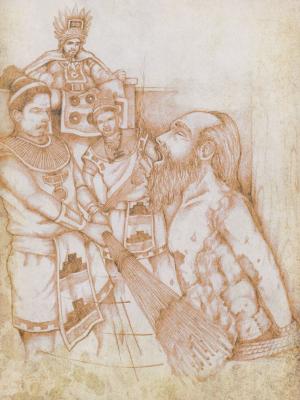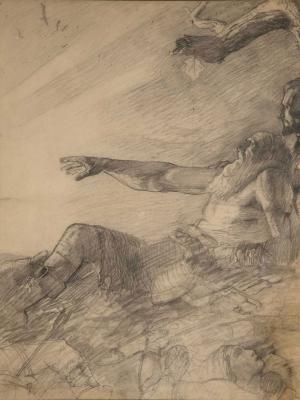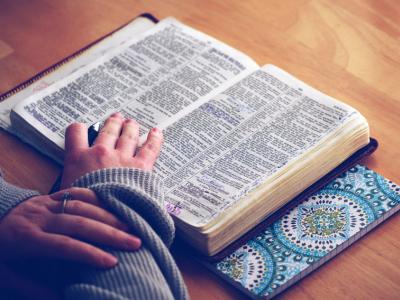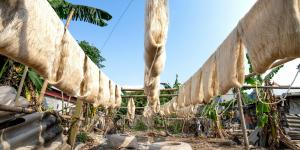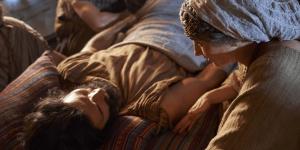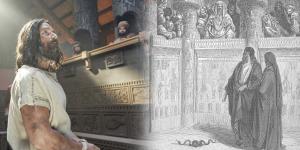You are here
How Can the Book of Mormon Survivors Give Us Hope?

Mormon 8:3
The Know
Hugh Nibley once described the Book of Mormon as a “tragic book” which begins and ends with destruction and lone survivors.1 Its prophetic authors had great cause to mourn, yet the fact that its message of hope in Christ was conveyed by those who had witnessed and survived the worst of human depravity only strengthens its spiritual power. As Steve Walker expressed, “If ever hope were earned, it is this optimism pervading the Book of Mormon narrative, even in the face of the end of all things.”2
Lehi, Nephi, and Jacob
When Lehi was called as a prophet, he was shown “great and marvelous things … concerning the destruction of Jerusalem” (1 Nephi 1:18). Years later, Nephi not only revealed that this destruction had taken place (2 Nephi 25:10), but he saw that in the future his own people would suffer a similar fate: “O the pain, and the anguish of my soul for the loss of the slain of my people! For I, Nephi, have seen it, and it well nigh consumeth me before the presence of the Lord” (2 Nephi 26:7).
Lehi’s son, Jacob, wrote that his people were “wanderers, cast out from Jerusalem, born in tribulation, in a wilderness, and hated of our brethren, which caused wars and contentions; wherefore, we did mourn out our days” (Jacob 7:26). In light of such sobering statements, Lisa Hawkins and Gordon Thomasson noted that “Lehi’s entire family can be considered survivor-witnesses of a sort, fleeing from … Jerusalem to save Lehi’s life.”3 Yet Lehi, Nephi, and Jacob all rejoiced in Christ and the Plan of Salvation on numerous occasions, even in the midst of sorrow and suffering.4
Alma the Elder
Alma can be seen as a survivor-witness of Abinadi’s prophecies and tragic martyrdom. After risking his own life by pleading on Abinadi’s behalf, Alma went into hiding, wrote down Abinadi’s words, and used them to gather a following (Mosiah 17:2–4). Sadly, Alma’s followers were forced to flee into the wilderness to escape King Noah’s soldiers, only to fall into bondage under Amulon and his Lamanite army a short time later. In the midst of these trying circumstances, the Lord declared to His people that He would ease their burdens so that they could “stand as witnesses for me hereafter, and that ye may know of a surety that I, the Lord God, do visit my people in their afflictions” (Mosiah 24:14).5
Alma the Younger and Amulek
While witnessing the terrible martyrdom of women and children by fire, “Amulek said unto Alma: Behold, perhaps they will burn us also. And Alma said: Be it according to the will of the Lord. But, behold, our work is not finished; therefore they burn us not.” (Alma 14:12–13).6 Alma and Amulek survived this ordeal when others didn’t, so that they could witness of and testify against the “the chief judge, and the lawyers, and priests, and teachers” who had committed such terrible crimes.7 While Alma and Amulek were being persecuted by their captors, an earthquake caused the surrounding prison walls to fall, and “every soul within the walls thereof, save it were Alma and Amulek, was slain” (Alma 14:28).8
Mormon
Mormon’s lament for the destruction of his people is filled with terrible anguish: “O ye fair sons and daughters, ye fathers and mothers, ye husbands and wives, ye fair ones, how is it that ye could have fallen! But behold, ye are gone, and my sorrows cannot bring your return” (Mormon 6:19–20).9 As a survivor-witness, Mormon declared, “I did stand as an idle witness to manifest unto the world the things which I saw and heard” (Mormon 3:16).10 Yet, despite such sorrow, Mormon also stated that he was “filled with charity” (Moroni 8:17) which “rejoiceth in the truth, beareth all things, believeth all things, hopeth all things, endureth all things” (Moroni 7:45).
Ether and Moroni
For years, Ether hid himself in the “cavity of a rock” while he witnessed and recorded the entire destruction of his people (Ether 13:18–24). Similarly, Moroni explained, “I even remain alone to write the sad tale of the destruction of my people” (Mormon 8:3).11 Yet at the very end, these faithful survivor-witnesses saw a bright future beyond death.
Ether could say, “Whether the Lord will that I be translated, or that I suffer the will of the Lord in the flesh, it mattereth not, if it so be that I am saved in the kingdom of God” (Ether 15:34). And in his final words, Moroni remarked, “I soon go to rest in the paradise of God, until my spirit and body shall again reunite, and I am brought forth triumphant through the air” (Moroni 10:34).
The Why
In a remarkable study on those who have survived terrible atrocities, Terrence Des Pres explained that having their story told is “enormously important to people facing extinction. In the survivor's own case … it becomes a way to transcend the helplessness which withers hope and self-respect.”12 This certainly seems to be the case with the Book of Mormon prophets who, in the midst of tragic episodes of grief and suffering, diligently recorded their experiences for future generations.13
In our own day, millions suffer from having experienced or witnessed terrible things. Soldiers who experience combat often suffer from post-traumatic stress disorder (PTSD).14 Countless individuals struggle with feelings of depression, loneliness, heartache, disappointment, disinterest, and a number of other personal sorrows, mental limitations, and emotional scars. Some of these feelings are due to severe chemical imbalances. Others may be caused by different circumstances out of an individual’s control. And sometimes those who suffer simply don’t have good answers for why they feel so unhappy.15
The Book of Mormon offers a powerful message of hope to those who for whatever reason have cause to mourn. It shows that while the suffering of its prophetic survivors was real and acute, their overwhelming sorrow was ultimately “swallowed up in the joy of Christ” (Alma 31:38). They mourned for the pain and suffering of their people, but they also looked to the future with hope. They knew that by witnessing and recording these sad experiences, they could help future generations avoid unnecessary sorrows. Elder Dallin H. Oaks has taught that “Lord will not only consecrate our afflictions for our gain, but He will use them to bless the lives of countless others.”16
In each case, the Book of Mormon’s sad tales of human atrocities help us refocus our minds and hearts on Jesus Christ—whose infinite sacrifice gives meaning and purpose to our very existence. Not only did Christ experience His own excruciating trials, but through His divine power, He willingly witnessed and participated in our suffering in a way that is personal to each of us.17 He is the ultimate survivor-witness. He descended below all things, witnessed the worst of death and hell,18 and yet rose again with hope and “healing in His wings.”19
Elder Jeffrey R. Holland taught, “It is only an appreciation of this divine love that will make our own lesser suffering first bearable, then understandable, and finally redemptive.”20
Further Reading
Jeffrey R. Holland, “Like a Broken Vessel,” Ensign, November 2013, 40–42, online at lds.org
Gordon C. Thomasson, “The Survivor and the Will to Bear Witness,” in Reexploring the Book of Mormon: A Decade of New Research, ed. John W. Welch (Provo, UT: FARMS, 1992), 266–268.
Lisa Bolin Hawkins and Gordon Thomasson, “I Only Am Escaped Alone to Tell Thee: Survivor Witnesses in the Book of Mormon” FARMS Preliminary Reports (1984): 1–13.
- 1. Hugh Nibley, Teachings of the Book of Mormon, 4 vols. (Provo, UT: FARMS, 1993), 1:62. In literary perspective, a comedy is a story where everything starts out well, descends into chaos, but then eventually ends well, following a pattern of the letter “V” or “W” (if there are multiple falls and returns). Tragedy, on the other hand, is where everything goes from bad, to worse, to unimaginably terrible, and the story does not end well, following the pattern of the letter “Z”.
- 2. Steve Walker, “Last Words: 4 Nephi–Moroni,” in The Reader’s Book of Mormon, ed. Robert A. Rees and Eugene England, Volume 7 (Salt Lake City, UT: Signature Books, 2008), xvii.
- 3. Lisa Bolin Hawkins and Gordon Thomasson, “I Only Am Escaped Alone to Tell Thee: Survivor Witnesses in the Book of Mormon” FARMS Preliminary Reports (1984): 8.
- 4. For examples, see 2 Nephi 2:25; 2 Nephi 4:30; 2 Nephi 9:18. See also, Allan D. Rau, “Cheer Up Your Hearts: Jacob's Message of Hope in Christ,” Religious Educator 14 no. 3 (2013): 49–63.
- 5. Emphasis added. See Book of Mormon Central, “How Does the Lord Make Our Burdens Light? (Mosiah 24:15),” KnoWhy 102 (May 18, 2016).
- 6. See Book of Mormon Central, “Why Does God Sometimes Allow His Saints to Be Martyred? (Alma 14:11),” KnoWhy 351 (August 11, 2017).
- 7. John W. Welch, Legal Cases in the Book of Mormon (Provo, UT: BYU Press and Neal A. Maxwell Institute for Religious Scholarship, 2008), 262–263.
- 8. See Book of Mormon Central, “What Kind of Earthquake Caused the Prison Walls to Fall? (Alma 14:29),” KnoWhy 121 (June 14, 2016).
- 9. See Book of Mormon Central, “Why Did Mormon Write So Little about His Own Time Period? (Mormon 2:18),” KnoWhy 227 (November 9, 2016).
- 10. See Book of Mormon Central, “What Was Mormon’s Purpose in Writing the Book of Mormon? (Mormon 5:14),” KnoWhy 226 (November 8, 2016).
- 11. See Book of Mormon Central, “Why Did Moroni Write So Many Farewells? (Mormon 8:1),” KnoWhy 233 (November 17, 2016); Mark D. Thomas, “Moroni: The Final Voice,” Journal of Book of Mormon Studies 12, no. 1 (2003): 88–99, 119–120.
- 12. Terrence Des Pres, “Survivors and the Will to Bear Witness,” Social Research 40 no. 4 (1973): 678.
- 13. See Hawkins and Thomasson, “I Only Am Escaped Alone to Tell Thee,” 1–13; Gordon C. Thomasson, “The Survivor and the Will to Bear Witness,” in Reexploring the Book of Mormon: A Decade of New Research, ed. John W. Welch (Provo, UT: FARMS, 1992), 266–268.
- 14. For the likelihood that several Book of Mormon prophets experienced the emotional and physical scars of war, see Morgan Deane, “Experiencing Battle in the Book of Mormon,” Interpreter: A Journal of Mormon Scripture 23 (2017): 250–252.
- 15. For a discussion of mental illness, depression, and hope in Christ, see Jeffrey R. Holland, “Like a Broken Vessel,” Ensign, November 2013, 40–42, online at lds.org
- 16. Dallin H. Oaks, “Give Thanks in All Things,” Ensign, 2003, online at lds.org.
- 17. See Dallin H. Oaks, “Strengthened by the Atonement of Jesus Christ,” Ensign, November 2015, 61–64, online at lds.org.
- 18. See Psalm 116:3; 2 Nephi 9:10–26; Revelation 1:18.
- 19. See 2 Nephi 25:13; 3 Nephi 25:2; Malachi 4:2.
- 20. Jeffrey R. Holland, “Like a Broken Vessel,” Ensign, November 2013, 40, online at lds.org
KnoWhy Citation
Related KnoWhys
Subscribe
Get the latest updates on Book of Mormon topics and research for free


